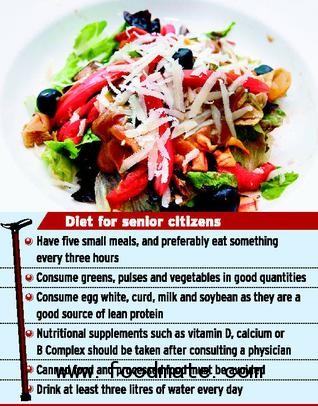
However, they emphasise that the diet needs to be individualised, based on the medical ailment that a person is suffering from. As a large number of elderly people suffer from ailments such as cardiovascular diseases, diabetes or hypertension, they have certain diet restrictions which results in compromised diet. Therefore, they need to pay more attention to nutrition.
Swetha Subramanium, a nutritionist, says that a large number of elderly people have sedentary lifestyles, due to which they need to monitor their carbohydrate intake as per their lifestyle.
Manjari Chandra, nutrition expert and chief consultant of Nutritionist Republic, says that because most elderly people are in a degenerative stage, they require a good quantity of proteins.
She, however, adds that as the elderly people have low metabolism, they should consume lean proteins such as egg white, curd, milk and soya.
Nutritionists say that they should avoid large meals and ideally break their meals into five small ones a day and eat well cooked food. Priyanka Rohatgi, president of the Bangalore Chapter of the Indian Dietetic Association, says, “They should maintain their meal timings, increase the frequency but reduce the volume. They should also avoid fasting and feasting.” Elderly people are asked by nutritionists to cut down on their saturated fats, sweets, oily food and reduce their intake of salt and sugar. They should avoid eating spicy food as it could irritate their gastritis.
Dr. Subramanium mentions that they are asked to reduce their intake of non-vegetarian food as there are hard to digest. She says, “Older people can consume non-vegetarian food such as chicken and fish in small quantities but they are asked to avoid eating other sea food and avoid mutton, pork and beef.”
According to the World Health Organisation guidelines, as one grows older, nutrient needs may be affected. While the requirements of some nutrients may be reduced, the need for others may increase.
Dr. Rohatgi says that elderly people require more antioxidants such as Zinc, Vitamin A, Vitamin E and Vitamin D to prevent effects of aging. Dr. Subramanium, however, says that those with cardiac ailments can reduce their Vitamin K supplements which help in clotting blood. Vitamin K is generally present in food such as oats, soya and egg yolk.







